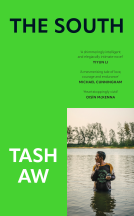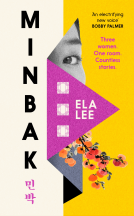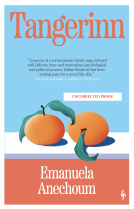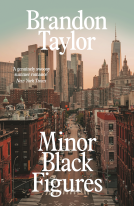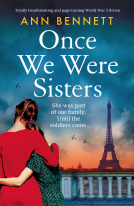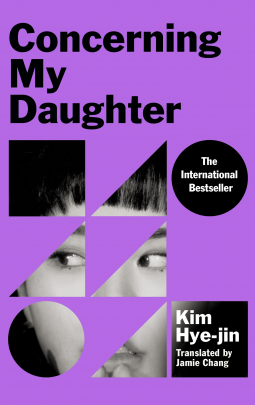
Concerning My Daughter
by Kim Hye-jin
This title was previously available on NetGalley and is now archived.
Send NetGalley books directly to your Kindle or Kindle app
1
To read on a Kindle or Kindle app, please add kindle@netgalley.com as an approved email address to receive files in your Amazon account. Click here for step-by-step instructions.
2
Also find your Kindle email address within your Amazon account, and enter it here.
Pub Date 14 Apr 2022 | Archive Date 13 Jul 2022
Pan Macmillan | Picador
Talking about this book? Use #ConcerningMyDaughter #NetGalley. More hashtag tips!
Description
The Prize-Winning International Bestseller
'I can't help but be moved by a story about women meeting, fighting, helping each other, looking after one another, and raising their voices against the prejudice and criticism they are subject to.'
Cho Nam-joo, author of Kim Jiyoung, Born 1982
When a mother allows her thirty-something daughter to move into her apartment, she wants for her what many mothers might say they want for their child: a steady income, and, even better, a good husband with a good job with whom to start a family.
But when Green turns up with her girlfriend, Lane, in tow, her mother is unprepared and unwilling to welcome Lane into her home. In fact, she can barely bring herself to be civil. Having centred her life on her husband and child, her daughter’s definition of family is not one she can accept. Her daughter’s involvement in a case of unfair dismissal involving gay colleagues from the university where she works is similarly strange to her.
And yet when the care home where she works insists that she lower her standard of care for an elderly dementia patient who has no family, who travelled the world as a successful diplomat, who chose not to have children, Green’s mother cannot accept it. Why should not having chosen a traditional life mean that your life is worth nothing at all?
In Concerning My Daughter, translated from Korean by Jamie Chang, Kim Hye-jin lays bare our most universal fears on ageing, death, and isolation, to offer finally a paean to love in all its forms.
Available Editions
| EDITION | Other Format |
| ISBN | 9781529057676 |
| PRICE | £14.99 (GBP) |
| PAGES | 176 |
Average rating from 19 members
Featured Reviews
 Reviewer 876149
Reviewer 876149
A dense, exceptionally powerful piece that grew out of Korean author, Kim Hye-jin’s desire to reflect on what the world might look like from her mother’s point of view, it’s narrated entirely from the perspective of a woman of around 70 who has a daughter in her thirties. Their relationship’s blighted by the mother’s inability to comprehend what her daughter, Green, wants from life and why she’s decided to live openly as a lesbian with her partner Lane. At first, I thought this might be another of those rather stereotypical presentations of age versus youth which reinforces ageism, and takes a rather superficial, clichéd approach to representing the fight for LGBTQ rights. But Kim transforms what initially appears to be a well-worn story of generational conflict, conservatism and prejudice, into something far more intricate and moving. Through her self-questioning narrator, Kim constructs a blistering indictment of a culture in crisis, where the social contract has pretty much failed. A society that makes incessant demands of its members, particularly women, but doesn’t deliver on its promises. A culture which is both deeply homophobic and appallingly ageist, with vast numbers of older people living in poverty.
Kim's narrator exists in a perpetual state of fear that borders on terror, she’s done everything required of her, made a suitable marriage, given birth, worked tirelessly but still she has almost nothing to show for it. Her husband’s dead, all she has is a crumbling home, and an exhausting, insecure, low-paid job as a carer in a facility for the elderly. Yet despite this, or perhaps because of it, she’s fixated on steering her daughter Green towards making the same choices, unable to let go of ingrained beliefs in the supremacy of conventional family life as a means to living well: a man, a woman, children. Something that her primary patient Jen, a once highly-successful, single woman, now rapidly deteriorating, chose not to pursue. Kim juxtaposes the narrator’s passionate advocacy for the unconventional Jen with Green’s fight for LGBTQ rights after her university colleagues are fired for introducing gay themes into their lectures. And it’s the relationship that slowly builds between the mother, Green, Lane and Jen that finally offers up the possibility of intimate connection, reconciliation and understanding.
Kim work’s demanding at times, she structures her narrative according to the logic of the narrator’s thoughts and feelings, so there are occasional abrupt shifts in time and setting, and information is drip-fed, with sentences or phrases that abruptly alter the sense of her narrator’s position on what’s unfolding around her. The scenes of appalling, casual cruelty in the care home where the mother works parallel the brutal treatment of the LGBTQ protestors at Green’s university, as they’re tormented by savagely homophobic, hate groups, highlighting the painful consequences of discrimination in various guises. Kim doesn’t quite pull things off here, at times she can be a little heavy-handed, underlining, or repeating points already clearly established. But still, it’s an impressive piece. For some western readers I imagine, as with Kim Ji-Young, Born 1982, this will be the type of book that elicits a certain type of voyeuristic, self-congratulatory response. But, although this is strongly rooted in contemporary, South Korean culture, there are many aspects of the ways in which discrimination operates here that should be familiar to anyone living in a similarly, advanced capitalist country: an emphasis on status symbols, outward appearance and positional goods, the ways in which an individual’s worth has become tied to wealth and economic power. South Korea has been slated, rightly, for its lack of recognition of LGBTQ rights and for its treatment of older people, but many of the situations depicted here are occurring elsewhere. In the U.K., to take just one example, there've been frequent exposes of cruelty in care homes, not to mention the large numbers of unnecessary deaths in these settings during the current pandemic, and despite anti-discrimination laws and improvements in the recognition of LGBTQ rights, vicious homophobic, hate crimes are rising rapidly.
First published in South Korea in 2017 as 딸에 대하여 ("About My Daughter"), Kim Hye-jin’s award-winning novel’s translated here by Jamie Chang.
This is a powerful book, one you cannot easily forget and stays with you and makes you think about it. It is brutal and honest and tells about complicated relationship of a mother and daughter. It tells the story of prejudices LGBTQ+ face even in prosperous and "advanced" countries like SK and how they are oppressed and silenced.
Concerning My Daughter is a novel about a woman whose thirtysomething daughter moves back in with her, bringing along her girlfriend and forcing the mother to face up to what she wants for her child. Translated from Korean, the narrative follows a woman who works in a care home, where she looks after a patient with dementia whose has no family but was well-renowned when younger. When the woman's daughter Green needs to move in with her, bringing along her girlfriend Lane, the woman finds it hard to be civil, wanting her daughter to get married and have children. Her fears are complex, revolving not only around the life she had, but on the treatment of her elderly patients without children to fight for their care.
This is an intriguing book, very simple in narrative and premise (traditional, homophobic mother struggles with how to deal with daughter), but also powerful in how it shows the impact society and tradition can have on viewpoints, and the intersection of different kinds of crises (in this case, care of the elderly and homophobia). It can be painful to read at times, repeating the protagonist's obsession with her daughter not having a 'real' relationship, and the depiction of the care of the elderly can be brutal, but there's also tenderness underneath, for example the glimpses of Green and Lane's relationship even only through the eyes of someone who won't accept it.
A lot of the key elements of the book are things that cross over many cultures and countries, particularly in terms of changing kinds of families and how various groups of people (including older people and LGBTQ people) outside of a traditional norm are treated. Some people might not like the simplicity of Concerning My Daughter and other people might find it too difficult to read the mother's perspective and her inability to listen about what kind of life her daughter wants to read, but it's a powerful look at a character struggling with the position of different women in society and how love can make people misguided.
Readers who liked this book also liked:
Philip Hoare
Arts & Photography, Biographies & Memoirs, Nonfiction (Adult)
